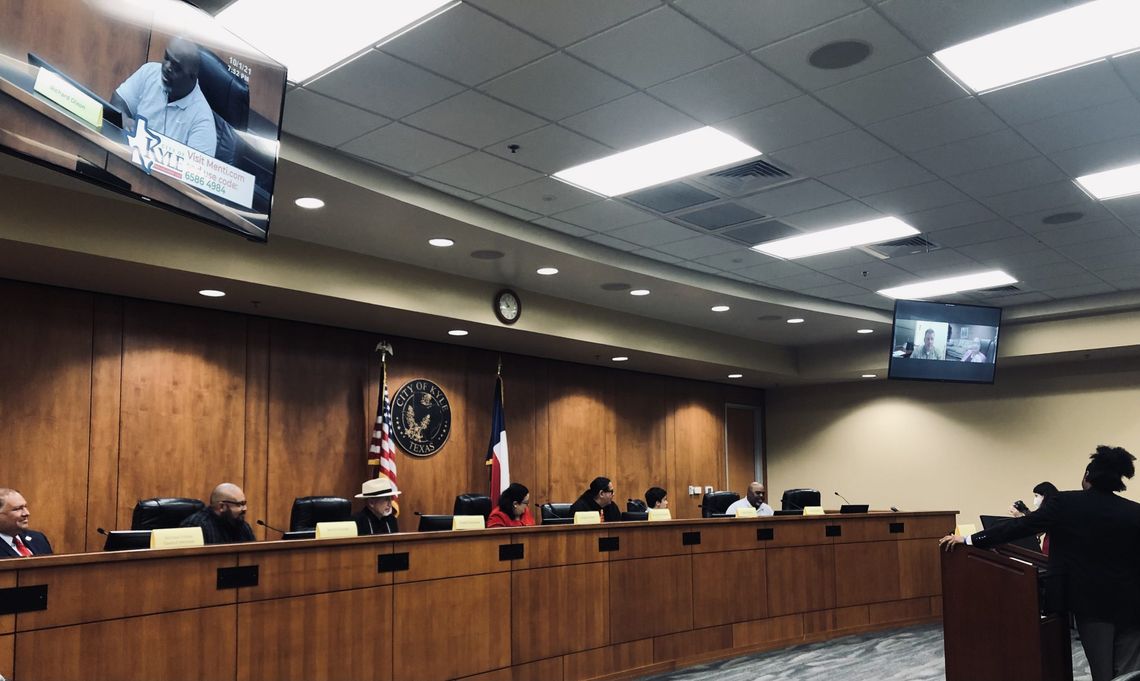By Brittany Anderson
Kyle community members joined together virtually and in-person at City Hall on Friday to celebrate Hispanic Heritage Month during Kyle’s fourth Dialogue for Peace and Progress event series.
The city has provided residents the opportunity to talk, listen, learn and grow through this series that aims to connect the community through honest conversations that raise awareness about cultural issues and facilitate change throughout the city.
Previous Dialogue for Peace and Progress events took place in conjunction with Black History Month (February) and Juneteenth (June 19). This panel marked the first series for Hispanic Heritage Month (Sept. 15 through Oct. 15).
Moderated by council member Dex Ellison, the panel consisted of Dr. Claude Bonazzo-Romaguera, sociology lecturer at Texas State University; Rubén Castañeda, Travis County juvenile public defender; Marcelina “Marcy” Rodriguez Garcia, author; Angie Villescaz, activist and organizer; Benito Pereda, Kyle parks crew member; Richard Dixon, building services manager at UT Austin; Jesús Jiménez, Hays High School class of 2021 valedictorian and neuroscience student at UT Austin; Dr. Octavio Pimentel, professor in the English department at Texas State University; and Kyle city council member Michael Tobias. Dr. Bonazzo-Romaguera and Garcia participated virtually.
L to R: Rubén Castañeda, Michael Tobias, Benito Pereda, Dr. Octavio Pimentel, Angie Villescaz, Richard Dixon, Jesús Jiménez and Dex Ellison. On the screen: Dr. Claude Bonazzo-Romaguera and Marcelina Rodriguez Garcia.
The panel touched on topics like the importance of Hispanic history education, panelists’ personal Hispanic identity and what Esperanza, the 2021 theme for Hispanic Heritage Month and means ‘hope’ in Spanish, means to them.
Panelists were given paddles with “I choose to speak up” on one side and “I choose to listen” on the other side to signal when they wanted to respond to a question or just listen to others’ responses.
“Because it’s a dialogue, we want to give everyone an opportunity to share their thoughts,” Ellison explained. “Listening is [also] an important part of a dialogue. Sometimes it’s about listening and understanding those around you.”
Audience participation was also encouraged through an online component where those watching could submit comments or questions for the panelists, as well as respond to questions posed by Ellison.
The panel spoke about present-day struggles within the Hispanic and Latinx community, including the lack of education regarding their history in the United States.
“Something that has struck me since I started teaching here is how many students don’t know anything about their Latin or Hispanic background,” Dr. Bonazzo-Romaguera said. “We need to formally integrate this into our education system and not just keep a white narrative. We’re only waiting until they get to college to really unpack some of these experiences and lived histories. By that time, they’ve essentially formulated a particular part of their identity and understanding of history, which kind of blurs what is actually going on.”
Other conversations included facing stereotypes, experiences with colorism and discussing power structures in the United States that have often worked against the Hispanic/Latinx community.
Castañeda said it’s important to have hard conversations that force people to talk about uncomfortable things in order to progress and repair, and said that things like HB 3979, an anti-critical race theory bill that was passed in Texas on Sept. 1, causes setbacks.
“My understanding of the law, and this is an oversimplification, is that those who passed it don’t want anything taught that will make people in the dominant culture feel bad,” Castañeda said. “We need to not do that. If we feel bad, we feel bad. But we progress and move forward.”
Villescaz also recognized the importance of having conversations like this within the Hispanic and Latinx community.
“This discussion ... has brought something to light that’s very important,” Villescaz said. “We, the Hispanic and Latino community of Hays, need to be having our own conversations. There is so much going on that we have members of our community that are uncomfortable hearing these stories themselves.”
Garcia remained a source of positivity for the panel, saying that through life-altering events like the COVID-19 pandemic and February 2021 freeze, the community stuck together despite their differences.
“I’ve been amazed at the beauty of the community coming together to help each other this year,” Garcia said. “It’s been a wonderful thing to see. Neighbors reaching out to neighbors, making sure that everybody was well. Not as different cultures, but as humanity. I think that’s a wonderful focus to continue having.”
The entire event was live streamed and can be watched on the City of Kyle YouTube channel. The next Dialogue for Peace and Progress event will take place in February 2022 in honor of Black History Month.
Photos by Brittany Anderson.










